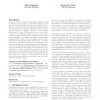Free Online Productivity Tools
i2Speak
i2Symbol
i2OCR
iTex2Img
iWeb2Print
iWeb2Shot
i2Type
iPdf2Split
iPdf2Merge
i2Bopomofo
i2Arabic
i2Style
i2Image
i2PDF
iLatex2Rtf
Sci2ools
135
click to vote
SIGOPS
2011
2011
Small trusted primitives for dependable systems
Secure, fault-tolerant distributed systems are difficult to build, to validate, and to operate. Conservative design for such systems dictates that their security and fault tolerance depend on a very small number of assumptions taken on faith; such assumptions are typically called the “trusted computing base” (TCB) of a system. However, a rich trade-off exists between larger TCBs and more secure, more faulttolerant, or more efficient systems. In our recent work, we have explored this trade-off by defining “small,” generic trusted primitives—for example, an attested, monotonically sequenced FIFO buffer of a few hundred machine words guaranteed to hold appended words until eviction—and showing how such primitives can improve the performance, fault tolerance, and security of systems using them. In this article, we review our efforts in generating simple trusted primitives such as an attested circular buffer (called Attested Appendonly Memory), and an attested human activ...
Fault Tolerance | Hardware | Security | SIGOPS 2011 | Systems |
Related Content
| Added | 15 May 2011 |
| Updated | 15 May 2011 |
| Type | Journal |
| Year | 2011 |
| Where | SIGOPS |
| Authors | Petros Maniatis, Byung-Gon Chun |
Comments (0)

